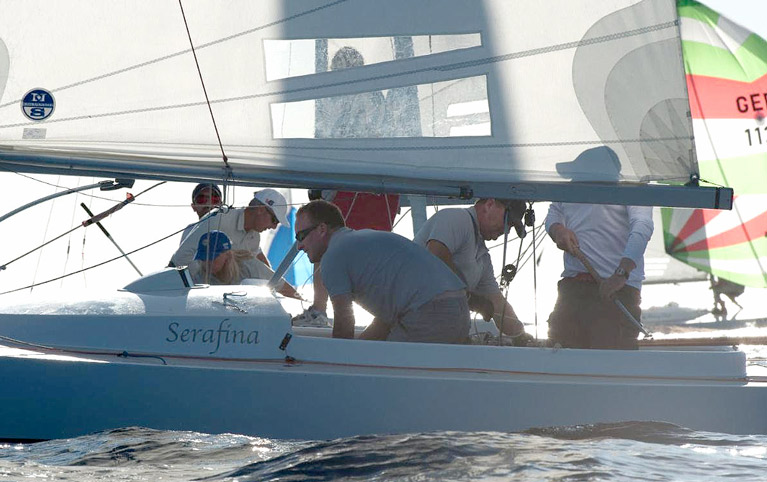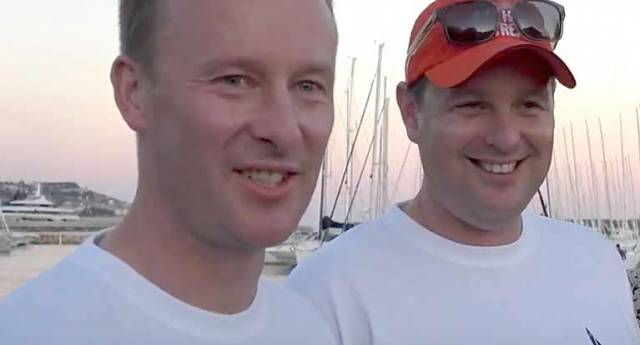Ireland's Daniel Murphy and Brian Goggin head Fleet B after the opening two races of the Dragon 90th Anniversary Regatta in Sanremo, Italy. It's the perfect start for the Kinsale entry who are in Italy as part of a nine-boat Irish team promoting the staging of the Gold Cup at the West Cork yacht club next year.
Day two of the Regatta brought beautiful hot sunshine and racing at last for the 150 strong fleet, who had been held ashore on day one due to strong winds and rough seas. The starts were initially postponed for a little over two hours to allow the wind to build, but by mid-afternoon a delightful 6-7 knots had filled in from the south east quadrant, enabling the Yacht Club Sanremo’s Race Committee to run two excellent qualifying series races.
 Irish Dragon Serafina has an early lead in Sanremo
Irish Dragon Serafina has an early lead in Sanremo
Listen in to Daniel Murphy and Brian Goggin talking about their early lead at 1.23 on the timeline of the vid below
and here's another vid below with Irish Dragon star Martin Byrne (centre) interviewing the leaders who talk more generally about the Irish teams in Sanremo plus a look forward to the 2020 Dragon Gold Cup in Kinsale.
The fleet has been split into two groups for the qualifiers, with each group racing on its own dedicated windward-leeward course. The light airs gave the tacticians and trimmers a good work out as they tried to pick the best lanes and constantly change gears to maintain maximum speed. Consistency was hard to find though and by the end of the day four different race winners had been identified.
First blood in Group A went to Anatoly Loginov sailing RUS27 ‘Annapurna’ with Ivan Bradbury’s beautiful wooden classic GBR375 ‘Blue Haze’, built in 1959 by Pedersen and Theusen, second and Philipp Ocker’s GER1135 ‘Birscherl’ third. Race two was won by Charlotte Ten Wolde in NED435 ‘Olinghi’, with Helmut Muller’s GER810 ‘Zille’ second and Joergen Schoenherr in DEN411 ‘African Queen’ third. Overall, however, the most consistent Group A performers were long standing International Dragon circuit supporters Mike & Monique Hayles’ GBR764 ‘Naiad’, and Jeroen Leenen’s UAE58 ‘Desert’, who both ended the day on 14 points. Alexander Ezhkov’s RUS2 ‘Alisa’ lies third with Bradbury fourth.
Charlotte Ten Wolde acknowledges that luck played a part in their second race victory. “The wind was steadier in the second race than the first. We had a pin end start and we just kept sailing until we reached the layline and managed to round first. Downwind we managed to get the shifts and had speed so stayed ahead of everyone else. I wish it worked like that every single time, but I guess we were just lucky!”
In Group B Vasily Senatorov, sailing RUS34 ‘To Be Continued’ won the opening race from Norbert Stadler’s SUI297 ‘Tachiston’ with Brian Goggin’s IRL180 Serafina, helmed by Daniel Murphy, third. The second Group B race was won by Evgenii Braslavets in ITA77 ‘Bunker Prince’ with Goggin and Murphy second and Jens Christensen’s DEN410 ‘Out of Bounce’ third. Overall Goggin and Murphy now lead Group B by two points from Christensen who took fourth in the opener, with Pieter Heerema’s NED412 ‘Troika’ in third thanks to a seventh and fifth place.
Daniel Murphy explained that starting was the key to success. “We had between 6 and 8 knots, reasonably steady but it built out to sea. We had a two and three today so a very good day on the water for us. Starting was everything. We got two very clear good starts right on the line with clear air and got a very nice jump straight away, so the start really was key.”
Back ashore the sailors gathered once again in the Regatta Village for the après sailing party which today was hosted by Glenfiddich. Glenfiddich’s Grant Gordon took the opportunity to make a special presentation to IDA Chairman Vasily Senatorov, the man who has personally been the driving force behind this 90th Anniversary celebration and who stands down as Class Chairman at the IDA AGM this coming Saturday, after two years at the helm. Coming on top of his race one victory, a clearly moved Vasily came to the stage to loud applause to receive his very special Glenfiddich gift.
 Dragon racing at the 90th Anniversary Regatta in Sanremo, Italy
Dragon racing at the 90th Anniversary Regatta in Sanremo, Italy
The third day of the regatta will feature the special Dragon 90th Anniversary Race in which both fleets will come together for a massed start. A special course has been set for the race which it is hoped will get underway at 11.00. The Anniversary Race will be followed by a series of special races for Lady helms, Classic Dragons, Junior crews, Masters crews and the Champion of Champions. To qualify for the Champions race, helms must be medallists from the Olympics, World and European Championships and World Cups in any class and the Dragon Gold Cup. Series racing will commence again on Thursday 10th October and the regatta will conclude on Friday 11th October.
All around the regatta interesting stories are emerging from the participants. For example, three of the regatta’s lady helms have discovered that they have more in common than they first thought. Long-standing Dragon sailors Gavia Wilkinson-Cox from the UK and Nicola Friesen from Germany were talking with fleet newcomer Anna Basalkina from Russia. Gavia Wilkinson-Cox takes up the story; “We have curiously found a very distant link that connects all of us and it actually goes back to 1972, the last year in which the Dragons sailed in the Olympic Regatta, in Kiel. Personally, I sailed in the British trials which were held in Torquay, my hometown, and subsequently, I was invited to attend the Olympic Regatta with the British Team.” Nicola continued, “I was too young to sail but I was with my father on the race committee for the Dragons at Kiel”. Anna added, “I was born in ‘74 so I had no idea about the Kiel Olympic Games, but I sail now on the 1972 Gold Medal winning boat.” Anna subsequently went on to represent Russia at the 2000 Games in Sydney in the Yngling, making the final link in the chain of this Olympic story.






























































